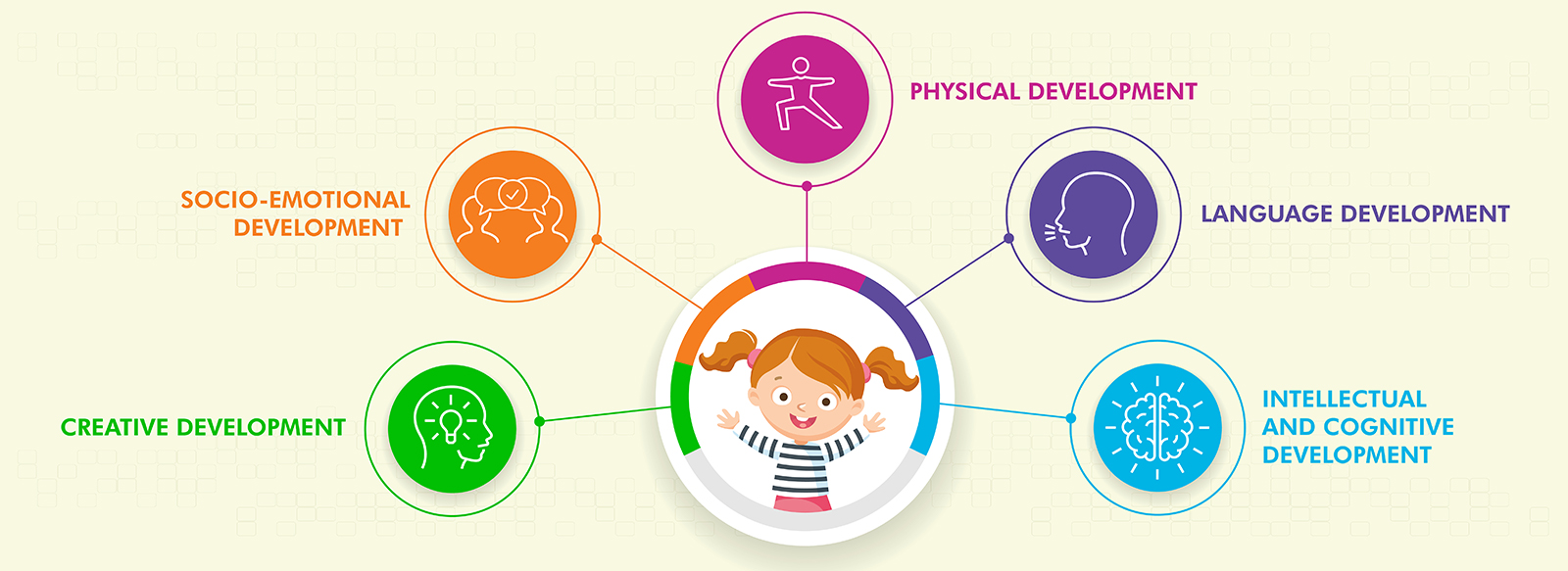
Early childhood education // A learning environment

For imparting Early Childhood Education programme, the following approaches are followed in teaching:
Activity Oriented
This approach follows the learning by doing methodology. The key principles of ‘Learning by Doing’ are Involvement, Participation and Contribution which certainly have a longer impact on the child’s brain when it comes to development. We provide the children real life experiences through special activities that include thinking, conversation, movement and creativity.
Playway Method
The playway method is essentially child-oriented and caters to individual needs, interests and abilities. Play is second nature to a child. It serves as a natural way for them to explore, express and involve with the world around them. Therefore, this approach supports the all-round development of a child. The experiences in this approach also make the child an active participant and not a passive recipient in the learning process.
Our effective programme is based on the provision of concrete first hand experiences to the child. We understand that at this age, they can perceive things more effectively on a sensory level. A verbal or written description may not make much sense to the children. Which is why we plan our activities in such a way that they can learn by touching, seeing and hearing things. By play, we encourage them to classify and handle a variety of objects. The implementation of all activities take place in the following ways:
Our effective programme is based on the provision of concrete first hand experiences to the child. We understand that at this age, they can perceive things more effectively on a sensory level. A verbal or written description may not make much sense to the children. Which is why we plan our activities in such a way that they can learn by touching, seeing and hearing things. By play, we encourage them to classify and handle a variety of objects. The implementation of all activities take place in the following ways:
- Simple to Complex
- Familiar to Unfamiliar
- Concrete to Abstract
The approach and methodology is practiced for activities in the following domains of development:
PHYSICAL & MOTOR DEVELOPMENT
The childhood of every Prideen should be no less than a carnival of good memories, love and enjoyment and we, at Achiever' International ensure they get ample opportunities to run, play and simply be themselves! Natural growth occurs best when children have lots of fun. And, all that fun happens at our splash pool, rain dance, doll house and the most colourful play area.
Key areas in Physical & Motor Development:
Key areas in Physical & Motor Development:
- Propar Growth (Monitoring Height & Weight of Children)
To make them stronger & sharper, a balanced diet is a must. Our in house kitchen helps provide hygienic and nutritious baby friendly food which is tasted by the incharges first, then served to the little ones. - Development of Gross Motor Skills
Gross motor skills mean developing control over the movements of the large muscles of the body. Activities like walking, running, swinging dancing, etc ensure that the students can get a good control over their body. Prideens also love their energtic taekwondo sessions wherein they learn perseverance with their kicks and punches. While, they enhance their flexibility during the peaceful yoga time. We also organise an annual Sports Day wherein our budding sportsmen participate in different competitions which include racing, rabbit jump, etc. - Development of Fine Motor Skills
Fine motor skills mean developing control over the movements of finer muscles, particularly finger muscles and hand-eye coordination. Activities like art & craft which include drawing, colouring, pasting as well as paper folding, thumb printing, pattern making, clay moulding and beading ensure a control over their fingers and also attain a perfect hand-eye coordination in a fun way.
LANGUAGE DEVELOPMENT
What good is knowledge that cannot be expressed! Language learning provides the foundation for all later learning. By the time children enter pre-school, they are already using a language at home. Achiever's International gives them the right experiences and environment to increase their vocabulary steadily and rapidly.
Key areas in Language Development:
Key areas in Language Development:
- Development of Listening Skills
We organise a circle time as a part of our daily schedule as well as conduct story-telling sessions and show the students, cartoon movies to develop their listening skills. During these sessions they also learn sound discrimination such as ‘voices of different animals’ or the sound of clapping, etc. To help them develop an ear for phonics, we conduct many activities using our our phonic card box. - Development of Vocabulary related of Body, Home and Environment
The children are indulged in fun conversations and action rhymes to introduce them with the vocabulary related to their body, home and environment. Picture reading cards, role play and dramatization are also used as a medium to enhance their vocabulary when it comes to the socio-emotional scenario. - Development of Oral Expression
Free conversation is the first activity after welcome and arrival activities. Children have a lot to express about what happened at their homes after they left school the day before. They are given absolute freedom to share their experiences and talk about anything they want. This way they learn to create sentences and use correct grammar. Show and tell is yet another activity which enhances their oral expression. - Development of Reading Readiness
Here is when our specially designed curriculum books come into picture. Through the visuals in the books, the children learn to identify objects as well as situations. Special introduction to letters activities are also conducted so that they can gradually identify letters and words mentioned in the book. - Development of Writing Skills
Before children write, they need experience in handling crayons and pencils. Thus, initially, they are indulged in drawing and colouring activities wherein they develop the skills of making controlled visual motor movements. Later on, they move on to joining dots, tracing, copying forms and making patterns similar to the letters of the alphabet.
SOCIO – EMOTIONAL DEVELOPMENT
Each child has his/her own unique ‘Personality’ which is the outcome of inheritance, social/cultural groups, different sorts of interactions, regular appreciation and exposure. Achiever's International provides the right kind of peer group which forms the learning ground for the child about right behaviour, friendship, sharing.
Key areas in Socio-Emotional Development:
Key areas in Socio-Emotional Development:
- Development of Positive Self Concept and Qualities of Initiative Independence and Leadership.
This is achieved by creating a sense of individuality in them through name cards or even celebrating birthdays in school. Qualities of leadership are gained when they are given responsibilities such as maintaining a straight line. In group activities, they also take on the lead role of reciting a story or while playing a game. - Development of Good Personal Habits
We regularly conduct story-telling sessions and puppet play that carry relevant messages of good habits. Picture cards of good and bad habits are also used to educate the children. As a part of the routine, they are asked to wash their hands before meals, visit the toilet during breaks, organise play material back in the racks after playing, etc. - Development of the Self-Confidence
As a part of the confidence building process, we organise many activities and events such as recitation competitions, fancy dress, fashion show, role play, class presentations and appreciation day. When they get an opportunity to perform in front of an audience, it automatically increases their confidence level. - Development of ability to respect the feelings of others and relate with adults
During the circle time, the students are indulge in interactions with their peers and teachers. They get a chance to freely express themselves, listen to others and exchange opinions. Their inquisitive minds are also addressed as the teachers are always willing to provide them with all answers and listen to their queries patiently. Lunch time is also a great way to encourage bonding between the peers as they learn to share their meals. We also believe that children’s curiosity and interests are stimulated when they interact with people, places, communities and the environment around us. To achieve this, we take them for picnics and excursions. - Development of attitude of care towards the environment
Our aim at Achiever's International is to create responsible global citizens. To become so, they need to be environmentally conscious as well. We believe that building a connect with nature at this age will go a long way in ensuring a sustainable environment. Thus, they often go for nature walks where they learn about the nature and also participate in tree plantation drives.
Loading





















